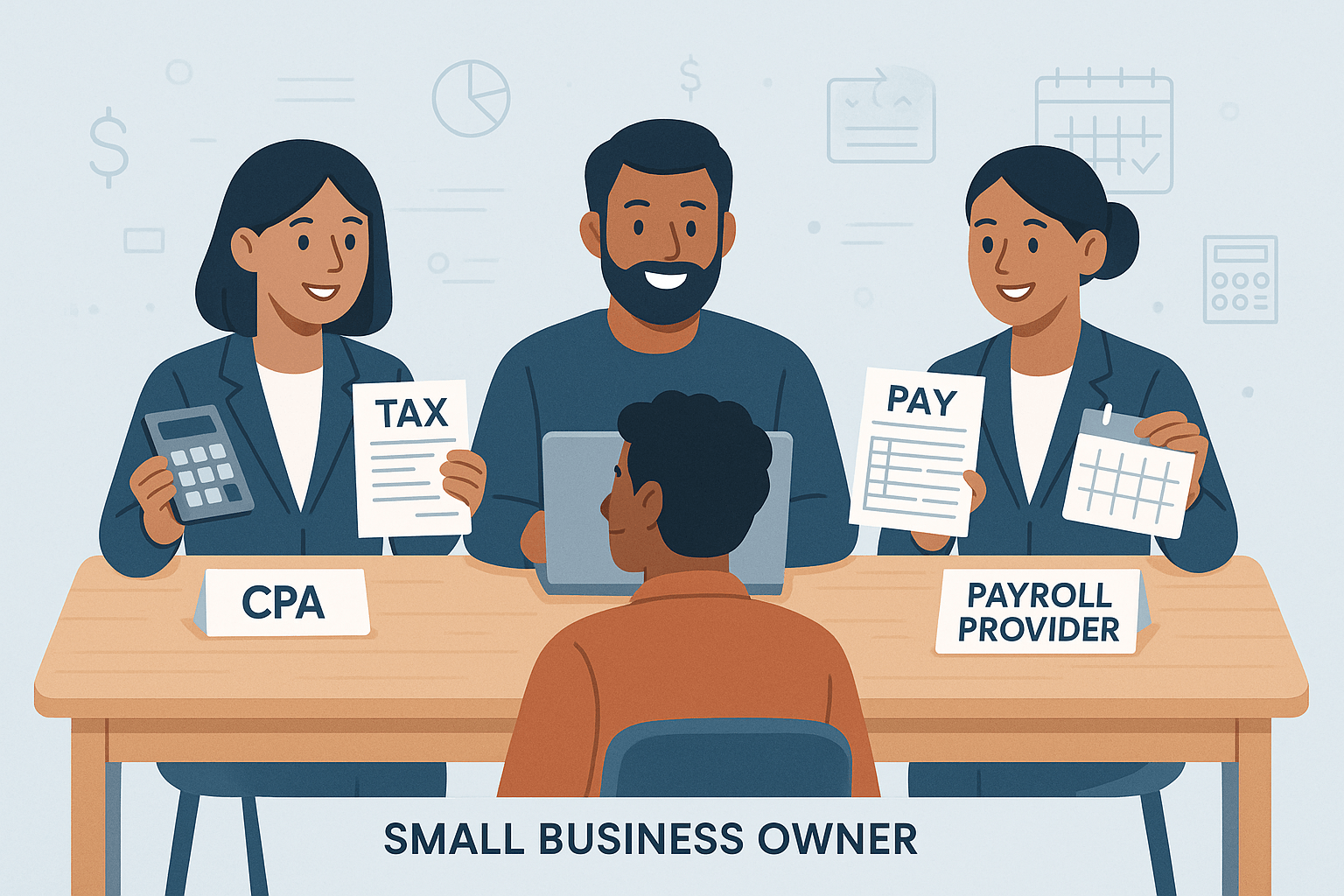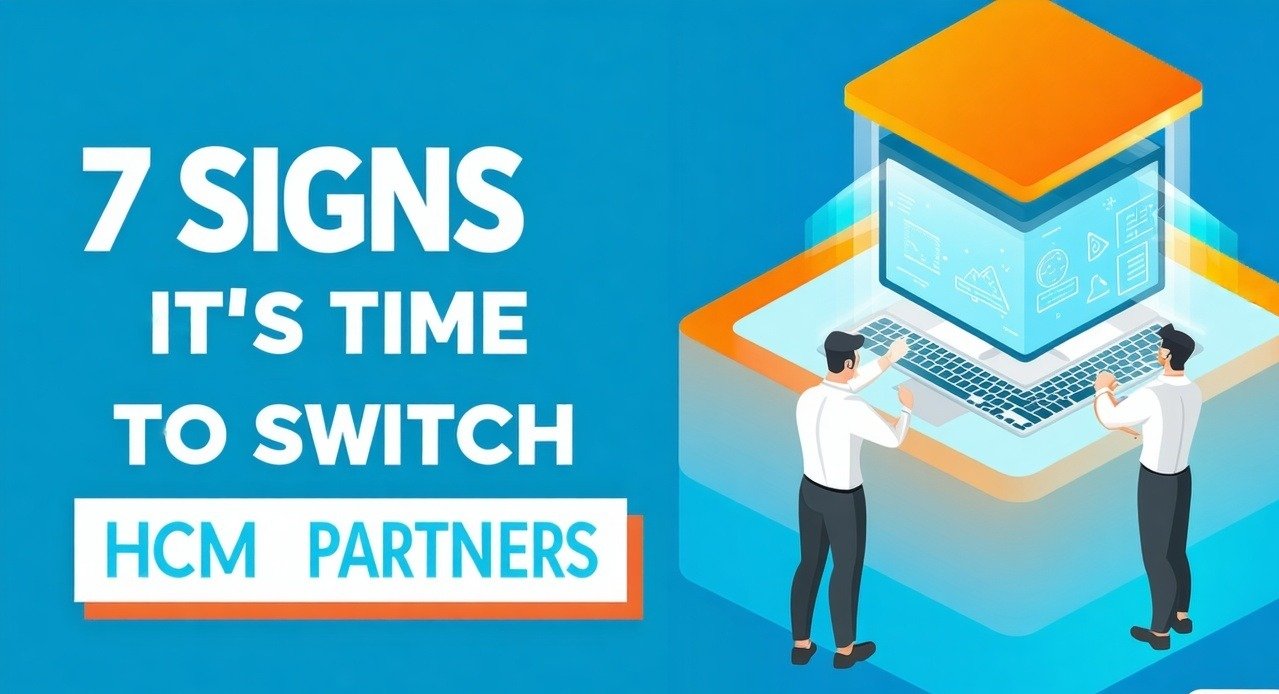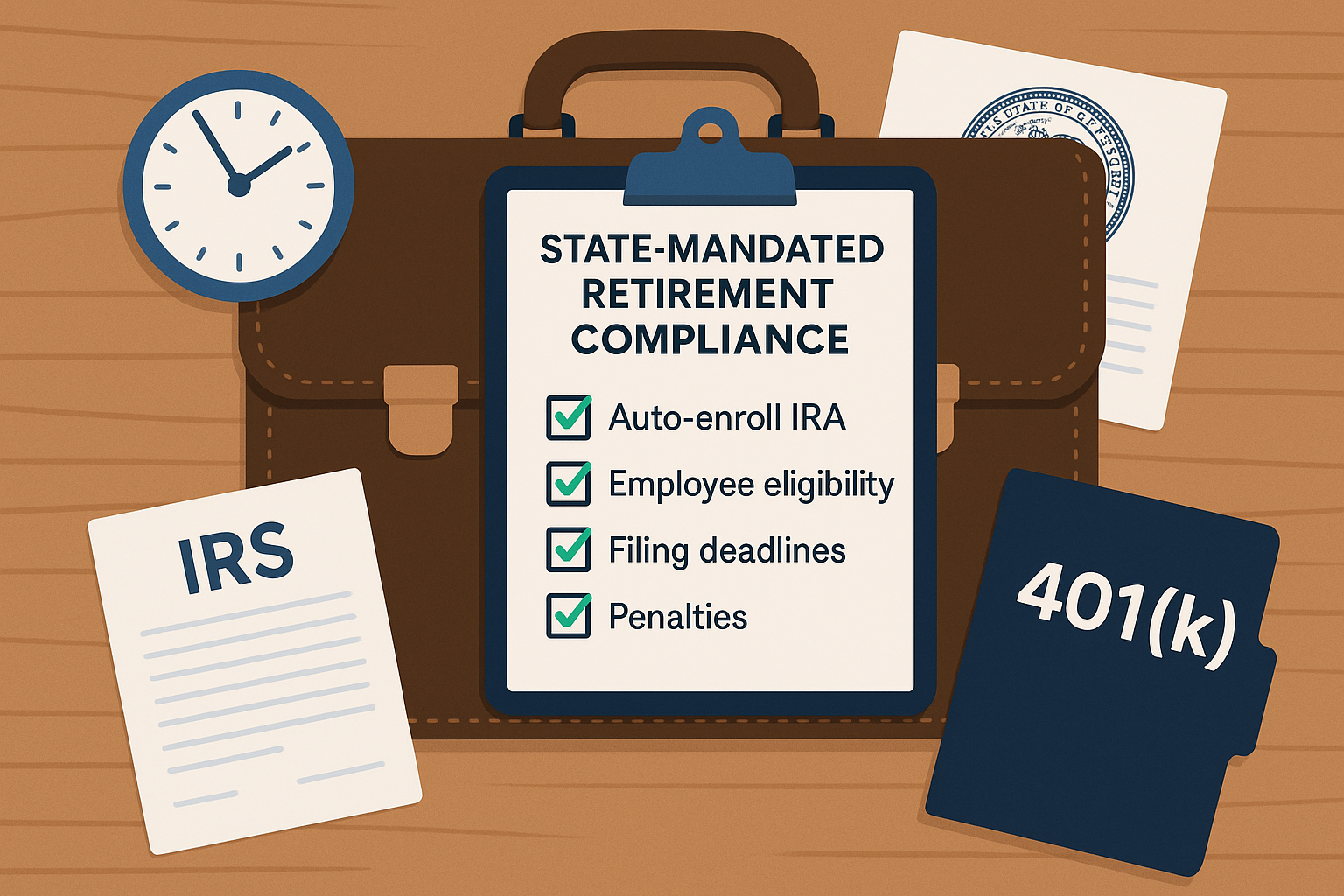Small Business Payroll Solution: Partnering Your CPA with a Payroll Provider
July 29th, 2025
11 min read

Let’s be honest—your CPA didn’t go into accounting to handle payroll questions. Yet, they might find themselves fielding late-night emails about PTO policies and navigating multi-state tax issues that eat into their core work. Sound familiar? Your CPA isn't alone in feeling stretched thin between core accounting services and the growing administrative demands their clients place on their firm.
At Lift HCM, we've worked alongside CPAs for over 50 years, witnessing firsthand how talented accounting professionals get overwhelmed by payroll complexities. We understand the pressure your CPA faces: you expect them to be your go-to business advisor for everything, yet taking on too much outside their expertise can strain relationships, burn out their staff, and expose their firm to unnecessary risks.
In this article, we'll show you exactly how strategic partnerships between your CPA and a trusted payroll provider can create better results for your business. You'll discover why this collaboration beats going it alone, what to look for in a payroll partner, and how these partnerships can actually strengthen your relationship with your CPA while reducing their liability. By the end, you'll have a clear roadmap for how this setup can help your CPA focus on high-value advisory services for you.
Table of Contents
- Why Your CPA and a Payroll Provider Should Partner Together
- The Hidden Costs of Your CPA Handling Payroll In-House
- What Your CPA Should Look for in a Payroll Provider Partnership
- How CPA-Payroll Provider Partnerships Improve Client Outcomes (for Your Business!)
- Best Practices for CPA-Payroll Provider Collaboration
- Common Questions About CPA-Payroll Partnerships
- Why Lift HCM Partners Effectively with CPAs (and Benefits Your Business)
- The Future of CPA-Client Relationships Through Strategic Partnerships
1. Why Your CPA and a Payroll Provider Should Partner Together
The most successful accounting firms—and by extension, the ones that serve your business best—don't try to be everything to everyone. Instead, they build strategic partnerships that complement their core expertise while delivering comprehensive solutions to their clients (like you).
The Complementary Strengths of Accounting and Payroll Expertise
Think of CPA-payroll provider partnerships like a well-coordinated relay race. Each runner has their specialized leg of the race, and for your business, success depends on smooth handoffs between teammates.
Here's how the responsibilities naturally divide:
CPA Core Strengths:
-
Annual tax preparation and strategic tax planning
-
Financial reporting and analysis
-
Regulatory guidance and compliance strategy
-
Business advisory and growth planning
-
Cash flow forecasting and budgeting
Payroll Provider Core Strengths:
-
Ongoing wage calculations and payroll processing
-
Employment law compliance and wage regulations
-
Time tracking and labor cost management
-
Employee self-service portals and communications
-
Multi-state payroll tax filings and reporting
When payroll is handled properly, it's invisible. But when it’s not, it quickly becomes a liability—both for the business owner and the CPA. A strong payroll partner can reduce that risk, while allowing CPAs to focus on tax, advisory, and financial strategy. Payroll providers and accountants bring different strengths to the table:
|
Function |
CPA Role |
Payroll Provider Role |
|
Tax Filing |
Annual tax prep, planning |
Ongoing wage, payroll tax filing |
|
Compliance |
Regulatory guidance |
Employment law and wage compliance |
|
Reporting |
Financial and tax reports |
Employee, time, and labor reports |
|
Client Support |
Strategic advisory |
Administrative and system support |
Together, they create a complete back-office solution for small business clients.
How Collaboration Reduces Client Risk and Improves Outcomes for Your Business
When your CPA and a payroll provider work together, they create multiple layers of protection for your small business. Here's why this matters to you:
Risk Reduction Through Specialization:
-
Payroll providers stay current on constantly changing employment laws
-
CPAs focus on tax implications and strategic planning
-
Both parties catch potential issues before they become costly problems
-
Your business benefits from specialized expertise in each area
Improved Client Experience:
-
Faster response times for different types of questions
-
More accurate information from subject matter experts
-
Seamless coordination between payroll and accounting functions
-
Reduced chance of conflicting advice or missed deadlines
The Business Case for Strategic Partnerships vs. Going It Alone
The numbers tell a compelling story about why partnerships make financial sense for your CPA's firm, and ultimately, for your business:
📊 Industry Statistics:
-
Roughly one-third of small businesses (around 33-40%) face IRS penalties annually due to payroll mistakes, according to various industry reports like those from the National Federation of Independent Business (NFIB) and Intuit.
-
CPAs who partner with payroll and HCM providers often see significantly improved client retention rates, leading to stronger, long-term relationships.
-
Compliance changes consistently rank as a top operational challenge for CPAs, with many surveys indicating it's a primary concern.
When your CPA's firm tries to handle everything in-house, they're competing with specialized providers who invest millions in compliance tracking, technology infrastructure, and expert staff. That's like trying to compete with a specialized restaurant while running a grocery store—possible, but not the best use of their (or your) resources.
2. The Hidden Costs of Your CPA Handling Payroll In-House
Many accounting firms fall into the payroll trap gradually. It often starts innocently: you, as a long-term client, might ask your CPA for help with a "simple" payroll question. Before they know it, they're fielding calls about PTO accrual policies, worker classification issues, and multi-state tax complications.
Common Payroll Mistakes That Create Liability for Accounting Firms (and Risk for Your Business)
Payroll seems straightforward until it isn't. Here are the most common mistakes that can create serious liability for your CPA's firm, and potentially costly problems for your business:
Tax Filing Errors:
-
Missing deadlines for quarterly payroll tax deposits
-
Incorrect calculation of state and local tax rates
-
Mishandling year-end W-2 and 1099 reporting requirements
-
Failure to account for multi-state employee tax obligations
Classification Mistakes:
-
Misclassifying employees as independent contractors
-
Incorrect overtime calculations for non-exempt employees
-
Improper handling of tips and commission structures
-
Missing meal break and rest period requirements
Compliance Oversights:
-
Failure to track changing minimum wage rates across jurisdictions
-
Missing required new hire reporting deadlines
-
Inadequate record-keeping for wage and hour audits
-
Overlooking industry-specific prevailing wage requirements
💡 Pro Tip: Even experienced CPAs can miss payroll nuances because employment law changes much more frequently than tax code—sometimes monthly at the local level. This is where costly mistakes can happen for your business.
Time Drain: Administrative Tasks vs. High-Value Advisory Services for Your Business
Let's break down the time economics of your CPA handling payroll internally:
Low-Value Payroll Activities (Time-Intensive for Your CPA):
-
Data entry and payroll processing: 2-4 hours per client per pay period
-
Researching compliance questions: 1-2 hours per issue
-
Troubleshooting payroll software problems: 30-60 minutes per incident
-
Employee onboarding and termination paperwork: 1-2 hours per employee
High-Value CPA Services (Revenue-Generating, and What Your Business Truly Needs):
-
Tax planning and strategy sessions: $200-400 per hour
-
Financial analysis and forecasting: $150-300 per hour
-
Business advisory consultations: $250-500 per hour
-
Estate and succession planning: $300-600 per hour
Below is a time allocation pie chart showing how payroll tasks consume valuable hours that could be spent on higher-revenue services (for your CPA) and more strategic advice (for your business).

Client Retention Risks When Payroll Problems Arise (and How It Affects Your Business)
When payroll goes wrong, your business suffers, and you likely won't blame the payroll software—you'll blame whoever recommended it or oversees it (your CPA!). This creates several risks for their firm, and ultimately, for your peace of mind:
Reputation Damage:
-
Payroll errors reflect poorly on your CPA firm's attention to detail
-
Clients may question your CPA's expertise in other areas
-
Word-of-mouth damage from frustrated business owners
-
Potential professional liability claims against your CPA
Relationship Strain:
-
Clients become demanding when their employees aren't paid correctly
-
Emergency payroll fixes consume relationship capital
-
Competing priorities between payroll urgency and tax deadlines
-
Difficulty maintaining professional boundaries
3. What Your CPA Should Look for in a Payroll Provider Partnership
Not every payroll company understands how to work effectively with CPAs. Some see accountants as competition rather than partners. Here's what your CPA (and by extension, you) should look for when considering a payroll partner:
Essential Qualities That Make Collaboration Successful
Transparent Communication Standards: A good payroll partner should establish clear communication protocols with your CPA from day one. This includes:
-
Regular updates on client payroll status and any issues
-
Direct contact information for escalating urgent matters
-
Shared access to payroll reports and tax filing information
-
Advance notice of system updates or process changes
Respect for CPA Relationships: A good payroll partner should enhance your CPA's relationships with clients (like you), not compete with them:
-
Clear boundaries about which services each party provides
-
Commitment to referring business advisory questions back to your CPA
-
Joint client meetings when appropriate
-
Co-branded materials and professional presentations
Technical Integration Capabilities: Modern partnerships require seamless data sharing:
-
Export capabilities for popular accounting software platforms
-
Standardized reporting formats for tax preparation
-
API connections where possible
-
Secure document sharing and storage systems
Red Flags to Avoid When Evaluating Potential Partners
Warning Signs of Poor Partnership Fit:
-
❌ Tries to handle everything in-house: Providers who want to do bookkeeping, tax prep, and business consulting are competing with your CPA, not partnering with them (and ultimately, this dilutes the specialized focus your business needs).
-
❌ Poor response times: If they don't return calls quickly during the evaluation process, they won't be responsive when your CPA needs them for client emergencies.
-
❌ Vague compliance processes: Partners who can't clearly explain their compliance monitoring and alert systems likely don't have robust procedures.
-
❌ Unwillingness to customize: Providers who insist on one-size-fits-all approaches won't adapt to your clients' specific needs.
-
❌ Hidden fees or complex pricing: Partners who aren't transparent about costs will create billing complications with your CPA and potentially with your business.
Questions to Ask Before Committing to a Partnership
Due Diligence Questions (Your CPA should ask, and you should feel confident in the answers):
-
"How do you handle communication with referring CPAs during payroll emergencies?"
-
"Can you provide references from other accounting firms you work with?"
-
"What's your process for keeping CPAs informed about compliance changes affecting their clients?"
-
"How do you handle client onboarding while keeping the CPA involved?"
-
"What reporting formats can you provide for tax preparation purposes?"
4. How CPA-Payroll Provider Partnerships Improve Client Outcomes (for Your Business!)
The real test of any business partnership is whether it delivers better results for the people you serve. Here's how CPA-payroll collaborations create measurable improvements for your business:
Real-World Benefits for Small Business Clients
Enhanced Compliance Protection: When your CPA works with specialists handling their area of expertise, your business's compliance coverage becomes more comprehensive:
-
Employment law specialists catch wage and hour violations before they become lawsuits
-
Tax professionals ensure proper withholding and reporting across all jurisdictions
-
Both parties monitor changing regulations in their areas of expertise
-
Your business receives proactive alerts about changes affecting your specific situation
Improved Cash Flow Management: Strategic collaboration helps small businesses like yours better manage their cash flow:
-
More accurate payroll forecasting and budgeting
-
Better timing of payroll tax deposits to optimize cash flow
-
Coordinated planning for year-end bonuses and benefit costs
-
Integration of payroll costs into overall financial planning
Streamlined Operations: Your business benefits from more efficient processes when systems work together:
-
Automatic data sharing between payroll and accounting systems
-
Reduced duplicate data entry and associated errors
-
Faster month-end and year-end closing processes
-
Simplified reporting for management decision-making
Measurable Improvements in Compliance and Efficiency for Your Business
Compliance Metrics:
-
98% reduction in payroll tax penalties for partnered clients
-
100% on-time filing rate for payroll tax returns
-
50% faster resolution of employment law questions
-
Zero wage and hour violations in partnered client base
Efficiency Gains:
-
60% reduction in payroll-related interruptions for CPAs
-
75% faster year-end W-2 processing
-
45% improvement in payroll accuracy rates
-
30% reduction in client payroll-related questions
5. Best Practices for CPA-Payroll Provider Collaboration
Successful partnerships don't happen by accident. They require intentional communication, clear boundaries, and a shared commitment to client success.
Communication Protocols That Keep Everyone Informed
Regular Check-ins: Establish routine communication schedules:
-
Monthly partnership review calls to discuss client status
-
Quarterly business reviews to identify growth opportunities
-
Annual strategic planning sessions to align on goals
-
Emergency escalation procedures for urgent client issues
Shared Documentation: Create systems for information sharing:
-
Joint client files with access for both parties
-
Shared calendars for important deadlines and meetings
-
Common client communication templates and procedures
-
Collaborative project management for complex implementations
Client Communication Standards: Develop protocols for client interactions:
-
Joint client onboarding presentations
-
Coordinated messaging about service changes or updates
-
Shared responsibility for client satisfaction surveys
-
Clear escalation paths for client complaints or concerns
Role Clarity: Who Handles What Responsibilities
Clear Service Boundaries (for your CPA and the payroll provider):
CPA Domain:
-
All tax-related advice and preparation
-
Financial statement preparation and analysis
-
Business advisory and strategic planning
-
Regulatory compliance outside of employment law
-
Cash flow management and forecasting
Payroll Provider Domain:
-
Payroll processing and wage calculations
-
Employment law compliance and updates
-
Employee onboarding and termination processing
-
Time and attendance tracking
-
Payroll tax filings and remittances
Shared Responsibilities:
-
Client relationship management
-
Year-end planning and preparation
-
New service recommendations
-
Problem resolution and client satisfaction
Technology Integration and Reporting Requirements
Data Integration Standards: Establish technical requirements for seamless operation:
Required Integrations:
-
Direct data export to popular accounting software
-
Real-time access to payroll reports and summaries
-
Automated year-end document generation
-
Secure file sharing for sensitive client information
Reporting Requirements:
-
Monthly payroll summaries in CPA-friendly formats
-
Quarterly payroll tax liability reports
-
Annual W-2 and payroll tax preparation packets
-
Custom reports for specific client needs
6. Common Questions About CPA-Payroll Partnerships
Will My CPA Lose Control of Our Relationship?
Short Answer: No, if your CPA chooses the right partner.
A professional payroll provider understands that your CPA has an established, trusted relationship with your business. The goal is to strengthen this relationship, not replace it.
How Good Partners Preserve Your CPA's Relationship With You:
-
Position the CPA as the primary business advisor
-
Refer all non-payroll questions back to your accountant
-
Include CPAs in important client communications
-
Respect existing fee arrangements and billing relationships
Red Flags That Indicate Risk to Your Relationship With Your CPA:
-
Provider wants direct access to all client financial information
-
Pushes additional services that compete with CPA offerings
-
Communicates with clients without keeping CPA informed
-
Suggests they can handle "simple" bookkeeping or tax questions
-
Shows reluctance to include CPA in client meetings
How Does Billing and Client Management Work (for your business)?
Common Partnership Billing Models:
Subscription-Based: Clients pay a single, recurring monthly fee that bundles payroll with other services like bookkeeping and tax filings. This creates predictable revenue and long-term client relationships.
Hybrid (Base Fee + Per Employee): This is the most common approach, combining a base fee with an additional charge for each employee. It balances the predictability of a flat fee with the scalability of the PEPM model. For example, a provider might charge a $99 base fee plus $10 to $50 per employee.
Fixed or Value-Based: The firm charges a set fee for payroll services. Value-based pricing takes this further by aligning the fee with the client's benefits or savings, rather than just the time spent.
Markup on Provider Fees: The CPA firm resells a third-party provider's payroll services, adding a markup to the provider's fees to earn extra revenue.
The most effective approach is often a hybrid model that combines subscription-based billing for core services with a base plus per-employee fee specifically for payroll. This offers the CPA firm stable revenue while providing clients with predictable costs that scale as they grow.
What Happens When Problems Arise?
Problem Resolution Protocols:
Minor Issues (payroll corrections, employee questions):
-
Payroll provider handles directly with client
-
CPA receives summary report of resolution
-
Documentation maintained in shared client files
-
Follow-up to prevent recurring issues
Major Issues (compliance violations, system failures):
-
Immediate notification to CPA within 2 hours
-
Joint client communication within 24 hours
-
Collaborative resolution with defined roles
-
Post-incident review to improve processes
Emergency Situations:
-
Direct phone contact between partners
-
Joint client emergency response
-
Coordinated crisis communication
-
Shared responsibility for client retention
💡 Pro Tip: The best partnerships are tested during difficult situations. Your CPA should choose a partner who handles problems transparently and takes shared responsibility for solutions.
7. Why Lift HCM Partners Effectively with CPAs (and Benefits Your Business)
With over 50 years of experience in payroll and human capital management, Lift HCM has developed specific expertise in supporting CPA partnerships.
Our 50+ Years of Experience Working with Accounting Firms
Deep Industry Understanding: We've been working with CPAs since before personal computers existed. This experience has taught us:
-
How accounting firms operate and what they value most
-
The seasonal rhythms and pressure points in CPA practices
-
Common client types and their specific payroll challenges
-
Technology integration requirements for accounting workflows
Proven Partnership Track Record:
-
Over 100 CPA firms in our partner network
-
95% partner retention rate over five years
-
Average 40% reduction in CPA payroll-related time investment
Technology Tools Designed for Accounting Integration (Benefiting Your Business)
CPA-Friendly Reporting Dashboard: Our partner portal provides CPAs with:
-
Real-time access to all client payroll data
-
Customizable reports for tax preparation
-
Year-end documentation and form generation
-
Multi-client overview for portfolio management
Popular Accounting Software Integration:
-
Direct integration with QuickBooks, Sage, and Xero
-
Custom export formats for specialized accounting software
-
API connections for larger firms with custom systems
-
Automated data synchronization to reduce manual entry
Security and Compliance Tools:
-
Bank-level security for all data transmission
-
Automated compliance monitoring and alerts
-
Audit trail documentation for all transactions
-
Professional liability insurance coverage for partnership services
The Future of CPA-Client Relationships Through Strategic Partnerships
Many CPAs juggle accounting, payroll, and advisory work, stretching themselves too thin and limiting their ability to provide value. Today’s leading firms succeed through partnerships—by teaming up with specialists like Lift HCM, your CPA can focus on strategic guidance while you benefit from expert payroll and compliance support.
This approach reduces risk for your CPA and ensures you receive higher-quality service. Ultimately, the strongest businesses are supported by focused teams of experts working together seamlessly—at Lift HCM, we’re committed to making that partnership work for you and your CPA.
Lift HCM is proud to support CPAs with tools, technology, and personalized service that fits into your workflow.
Explore our CPA partnership options today!
Caitlin Kapolas is a results-driven professional with a strong background in account management and retail. She is dedicated to improving client experiences and building lasting relationships. Caitlin excels in identifying client needs, resolving issues, and implementing customized solutions that drive value. Her effective communication skills ensure high client satisfaction and loyalty, making her a trusted advisor and partner in meeting client needs with precision and professionalism.
Topics:








.jpg?width=5406&height=3604&name=payroll-concept-with-cubes(1).jpg)

.jpg?width=1344&height=768&name=a%20software%20interface%20showcasing%20payroll%20management%20tools(1).jpg)


